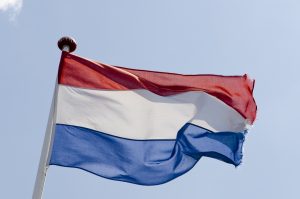The government of the Netherlands has released a new policy document outlining a new strategy for the Indo-Pacific region, following similar recent moves by its European neighbors France and Germany.
The new policy document, which was released by the Ministry of Foreign Affairs on November 13, foreshadows a greater focus on Asia, in apparent recognition of China’s growing assertiveness and the European Union’s increasing economic and trade partnerships with the region.
The new policy, which has not yet been published in English, reportedly calls on the European Union to speak out more strongly on the tensions in the South China Sea, where China has asserted its power to reinforce expansive maritime claims.
“The EU should seek cooperation with countries in the region for free passage and guarantee maritime safety,” states the policy. “In that context, the EU must express itself more often and more strongly on developments in the South China Sea that violate the United Nations Convention on the Law of the Sea.”
According to one precis of the document, the policy argues that the return of great power competition calls for a new strategic to Asia, in order to safeguard the region’s create space for strategic autonomy. It calls for the Netherlands and the EU to deepen its ties with regional powers like Australia, New Zealand, South Korea, Japan, and India – all of which share concerns about China’s rise in the region – as well as with Southeast Asian nations like Indonesia, Singapore, Malaysia, and Vietnam.
The Dutch policy states that the Indo-Pacific should not to become “a plaything between the great powers” – and for good reason, given the Netherlands’ growing economic interests in the region. In 2019, the country was the largest importer of goods from the ten nations of the Association of Southeast Asian Nations (ASEAN) in the EU, an amount totaling 30 billion euros. In 2016, it exported nearly 7.5 billion euros worth of goods to the Southeast Asian bloc. According to the policy document, some 22.5 percent of total Dutch imports come from countries in Asia.
The Dutch announcement signals the further diffusion of the Indo-Pacific concept outside Japan and the United States, its centers of origin, and foreshadows a possible joint EU policy on the region. While the Netherlands claims that its policy represents a “unique Dutch vision,” it is broadly consistent with the souring of European attitudes toward China that have underpinned the widespread adoption of the idea.
In September, Germany announced a new strategy designed to allow it to make “an active contribution to shaping the international order in the Indo-Pacific.” This followed France’s adoption of the Indo-Pacific concept back in May 2018.
As I noted of the German Indo-Pacific strategy announced in September, the Netherlands’ move is indicative of a broader souring of European views toward China, and the EU’s greater stake in a region that is increasingly central to the European and global economies.
This negative sentiment is also reflected in the European public at large, as borne out in a public opinion survey conducted recently by the Palacky University Olomouc in Czechia. The study, which surveyed 19,000 respondents in 13 European countries, recorded a significant deterioration in European attitudes toward China over the past three years, particularly in western Europe.
In a thread on Twitter, Veerle Nouwens of the Royal United Services Institute predicted that Amsterdam’s pivot toward the Indo-Pacific was likely to lead to lead to “a louder [Netherlands] voice” on the disputes in the South China Sea and on questions of international maritime law, “whether through [the] EU or with Germany and France.”
Irrespective of whether the Netherlands’ Indo-Pacific strategy will make much difference to the balance of power in the South China Sea, it is likely to to herald Europe’s increasing strategic focus on the vast region stretching from eastern Africa to the west coast of the United States. Expect more countries – and possibly the EU itself – to follow.

































